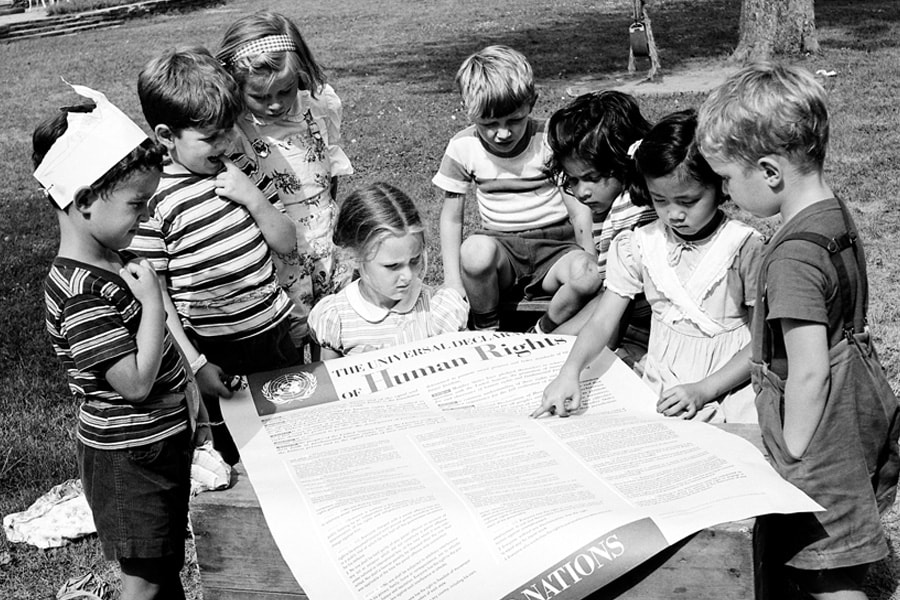
Human Rights Day: Aronson Helps Put Focus on Scientific Freedom
International Human Rights Day, Dec. 10, has a scientific focus this year. It coincides with the American Association for the Advancement of Science's (AAAS) recently released scientific freedom and responsibility statement, promoting scientific freedom and scientific responsibility.
"Human Rights Day is a time to reaffirm that we all possess certain basic rights that no individual, corporation, group or governmental entity can abridge or take from us," said Carnegie Mellon University's Jay D. Aronson, associate professor of science, technology and society in the Dietrich College of Humanities and Social Sciences' Department of History and director of CMU's Center for Human Rights Science (CHRS).
Aronson serves on the AAAS Committee on Scientific Freedom and Responsibility (CSFR), which developed the statement and has rolled out online resources for scientists, human rights advocates and policymakers. CSFR is an advisory committee to the AAAS Scientific Responsibility, Human Rights and Law program.
The CSFR's full statement reads:
Scientific freedom and scientific responsibility are essential to the advancement of human knowledge for the benefit of all. Scientific freedom is the freedom to engage in scientific inquiry, pursue and apply knowledge and communicate openly. This freedom is inextricably linked to and must be exercised in accordance with scientific responsibility. Scientific responsibility is the duty to conduct and apply science with integrity, in the interest of humanity, in a spirit of stewardship for the environment and with respect for human rights.
"The statement recognizes the societal value of science and the pursuit of knowledge, but just as importantly, it reminds those of us in positions of privilege that we have a responsibility to work to ensure human rights for all people around the world," Aronson said. "This duty is particularly strong at Carnegie Mellon, where we are building technologies and pioneering new knowledge that will have a profound impact on the planet and its peoples for generations to come."

Aronson said the statement is aspirational - it tells us how science and its relation to society ought to be and provides a framework to evaluate current and proposed research efforts in this regard. However, AAAS and the committee note that scientists' conduct is often constrained by a variety of political, economic and institutional factors.
To explore some of these issues, Aronson authored a supplemental article that addresses the circumstances under which the ideals of scientific freedom and responsibility may fall short. The topics included: research in contexts where data and results cannot be freely collected or shared due to national security or economic concerns; doing research in non-democratic societies; and handling findings or data could be detrimental to society.
"Even though it may not be possible for scientists to uphold all of the values laid out in [the AAAS statement, they still must not use their knowledge, expertise, or creations to violate human rights or human dignity, cause unnecessary pain or suffering to non-human organisms, or disproportionate damage to the environment whenever it is possible to make another choice. Scientists should interpret restrictions, rules and directives that impinge on human rights and freedom as narrowly as possible and resist them when feasible," Aronson wrote.
Robin Mejia, manager of the CHRS Statistics and Human Rights program, believes scientific freedom is crucial to generating the kinds of data needed to assess and measure whether human rights are being violated. She notes that targeting scientists can be a way governments attempt to control data.
"A functioning democracy requires independence of agencies that gather and measure the data used to make policy decisions," said Mejia, who serves as vice chair of the American Statistical Association (ASA) Committee on Scientific Freedom and Human Rights. She has coordinated the ASA's response in the case of Andreas Georgiou, a Greek economist being targeted in his home country for producing accurate debt figures.
The United Nations will use Human Rights Day 2017 to kick off a year-long campaign to mark the upcoming 70th anniversary of the Universal Declaration of Human Rights a milestone document that proclaimed the inalienable rights that everyone is inherently entitled to as a human being - regardless of race, color, religion, sex, language, political or other opinion, national or social origin, property, birth or other status. Join the conversation with #StandUp4HumanRights.